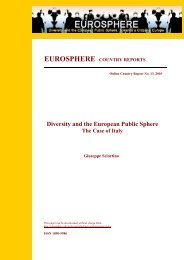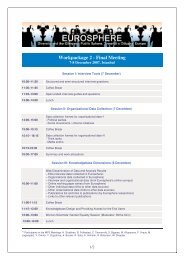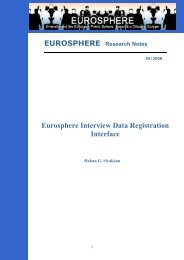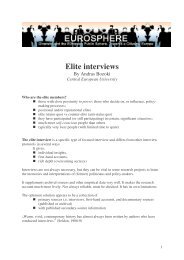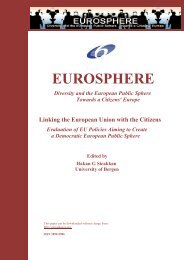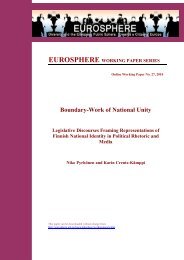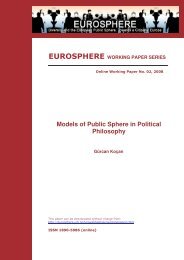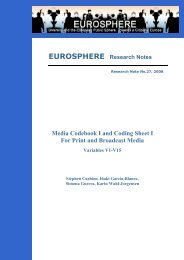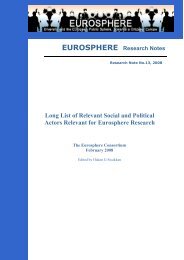Migrants, Minorities, Belongings and Citizenship. Glocalization and ...
Migrants, Minorities, Belongings and Citizenship. Glocalization and ...
Migrants, Minorities, Belongings and Citizenship. Glocalization and ...
Create successful ePaper yourself
Turn your PDF publications into a flip-book with our unique Google optimized e-Paper software.
The major objection to a comparison strategy with empirical ideal types is that no choice<br />
of an empirical ideal type, on which comparisons are to be based, can be justifiable<br />
based on satisfactorily objective scientific criteria. Secondly, as the situation of Europe is<br />
different from the existing empirical ideal types, such a comparison strategy would not<br />
produce valid knowledge. Thirdly, deployment of empirical ideal types in comparative<br />
analyses may result in establishing an empirical model as a norm. Furthermore, the<br />
cases’ proximity to or distance from empirical ideal types may result in ignoring<br />
important particularities of the cases. Therefore, Glocalmig opts for a strategy where all<br />
empirical cases are treated equally <strong>and</strong> where no empirical case is assumed to be a<br />
model for the others.<br />
Another problem with the above measurement <strong>and</strong> scaling strategies is that they deploy<br />
only one ideal type of the phenomena. As an alternative to these two strategies of<br />
comparison, the University of Bergen has developed the prototypes of three<br />
complementary comparative analysis strategies, which are designed to by-pass the<br />
aforementioned defects in the existing methods. 2 These are:<br />
● Descriptive Comparison of Absolute Values of Cases.<br />
● Comparison with multiple empirical ideal types (relative measurement), which<br />
employs a separate ideal type for each case. In Glocalmig, the quality of citizenship<br />
of the most privileged part of majority population in each country has been<br />
employed as the empirical ideal type for each country; thus measuring the quality<br />
of citizenship in each country with respect to its own privileged citizens.<br />
● Comparison with multiple contesting theoretical ideal types (normative<br />
measurement), which employs the existing as well as Glocalmig’s own ideal type in<br />
an analysis technique that simultaneously compares both the ideal types<br />
themselves <strong>and</strong> the cases with the ideal types. Scales <strong>and</strong> rankings here will be<br />
based on multiple contesting theories.<br />
Used together, these three methods of comparison, measurement <strong>and</strong> scaling/ranking<br />
constitute an unprecedented set of research tools for comparatively mapping <strong>and</strong><br />
assessing the quality of citizenships in Europe as well as a device for continuously<br />
monitoring the changes in policy-related facts for developing inclusive citizenship<br />
practices <strong>and</strong> European public spaces. Concerning Glocalmig’s strategic <strong>and</strong> scientific<br />
2 These have been developed in Sicakkan, H.G. Senses That Make Noise & Noises That Make Sense (1999), The<br />
Political Historical Roots of West European Models of <strong>Citizenship</strong> (1999), Rasisme mellom republikansime og<br />
kommunitarisme (1998), all published by Bergen: IMER N/B Publications.<br />
47



